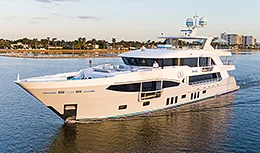- Alaskan Yachts
- Azimut Yachts
- Back Cove Yachts
- Beneteau Yachts
- Benetti Superyachts
- Bertram Yachts
- Boston Whaler
- Broward Yachts
- Buddy Davis Sportfish
- Burger Yachts
- Cabo Yachts
- Catamarans
- Carver Motoryachts
- Center Console
- Chris-Craft Yachts
- Cruisers Yachts
- DeFever Trawlers
- Dufour Sailboats
- Fairline Yachts
- Feadship Yachts
- Ferretti Yachts
- Formula Yachts
- Fountaine Pajot Cats
- Grady-White
- Grand Banks Trawlers
- Hargrave Yachts
- Hatteras Yachts
- Hinckley Picnic Boats
- Horizon Yachts
- Hydra-Sports
- Intrepid Boats
- Jarrett Bay Sportfish
- Jeanneau Yachts
- Kadey-Krogen Trawlers
- Lazzara Yachts
- Lekker Boats
- Luhrs Sportfish
- Marlow Yachts
- Maritimo Yachts
- Marquis Yachts
- Mazu Yachts
- McKinna Motoryachts
- Meridian Yachts
- Midnight Express
- MJM Yachts
- Mochi Craft
- Neptunus Motoryachts
- Nordhavn Trawlers
- Nordic Tugs
- Numarine Yachts
- Ocean Alexander Yachts
- Ocean King
- Offshore Yachts
- Outer Reef
- Oyster Sailing Yachts
- Pacific Mariner Yachts
- Palmer Johnson Yachts
How to Qualify a Yacht Broker
A good broker can be hard to find when looking to buy or sell your boat. Denison yacht brokers weigh in on what makes a broker a good one.
Brokers come in all shapes and sizes. Some yacht brokers have specialties, including specific brands or particular boat types (like sailboats or catamarans). Others have years of experience and proven sales to back up their expertise. If you’re in the market to buy a new boat or sell the one you currently have, you may be overwhelmed by the amount of brokers out there. Here, Denison brokers delve deep to share what makes a broker the right one for you and your needs.
Denison broker Peter Quintal has been in the industry for over 20 years. With many yacht sales under his belt, he knows a lot about what works when it comes to making clients happy–besides the fact that he has filled the role of “client” many times, having owned 18 boats in his life. When it comes to brokers, he says: “It’s no different than real estate. There are good realtors and there are bad realtors. There are good brokers and there are bad brokers.”
“If a client is new to the scene and they’re getting into it, they really should interview the broker, ask the right questions. If they’re looking for a new boat, find out what new boats they can offer. Find out how long they’ve been in the business. Did they just come from a car dealership and they’re trying their hand at selling boats, or are they just coming from real estate because they were bad at real estate and they’re trying to sell boats? I would have a conversation ahead of time and ask them, what are your annual sales? What do you focus your sales on? What size range? What style? They could be a sailboat broker who really doesn’t focus on powerboats, or they could be a powerboat guy who only focuses on that and doesn’t know anything about sailboats. They want to find somebody who knows the market for what they want to buy.”

“Also, successful brokers have repeat customers. There are a lot of guys that are one-and-done. They slam a customer into a boat and they don’t see past that closing date or that paycheck. I’ve been in the business 21 years and I’ve had customers buy seven, eight, nine boats with me in a very short window of time. So you want to look at somebody who has relationships and don’t be afraid to ask for referrals. Have a conversation, especially if you’re purchasing a larger asset. You want to understand other people’s experiences that have worked with that broker before.”
“There’s a lot of confusing information. They’re going to get a lot of opinions from a lot of different people and I’d say just do their homework. They can check on the internet, they can look up a broker online. They can check client reviews of that broker. It’s all pretty public. You can find out if that broker has ever been sued, let’s say for bad practices.”
The vetting should also go further than just the broker–the brokerage firm can speak volumes as well. A client should also keep in mind what types of boats certain companies represent. “There are small, mom-and-pop companies that specialize in certain size range of boats, but if you’re looking at a certain size vessel that those mom-and-pops are not used to handling, don’t go to a small firm that sells small boats to buy a big boat. The boat will determine the broker and the firm that are looking out for your best interest. I have the ability to work wherever I want and I’ve chosen to be with Denison for 12 years.”

Denison broker Brian Nobles has been with the company for 11 years, and has seen his fair share of deals. “The biggest thing that I’ll do is try to pre-qualify somebody and vet the client,” he says. “It’s good to ask pre-qualifying questions like: are you looking to buy this season or next season, do you currently own a boat, what kind of boat do you have? Once you talk about what their perfect day on the water is, whether it’s with friends, family, etc., you break down those barriers and build rapport, you can ask them how they plan to pay for the boat, and see if putting 20% down is an issue, to really get the ball rolling. Find out where they plan on docking the boat. You need to find out if it’s the right boat for them. That’s what makes a broker really good at boat shows, is that you have a limited amount of time. You need to stay quick on your feet and ask the right questions.” Vetting a client can help a broker not only understand if a buyer is ready to purchase a yacht, but what boats will fit their preferences and be the right fit.

Denison broker Jon Plewniak shared his opinion of what a good broker does. “One of the biggest things, which is why I share weekly newsletters, is that people that are active in the industry. Some brokers are captains or work in the marine industry They go to events, network, and find boats that are off-market that are available for sale before they actually go on market. Somebody that can stay on top of the market and knows market pricing and what’s moving and what’s not (which is what brokers are here for).”
“After that, I’m guiding you through everything,” he shares, “Sea trial and survey, the process of buying a boat, the negotiations of it. There’s going to be key processes and if a broker doesn’t know the mechanical sides of the boat and things like that, that’s important. Because anyone can look at a survey and say it looks good, but being able to know what it is is important.”
“With a good broker, a broker isn’t going to be there just for the sale of the boat, but they’re going to be there for the whole ownership of the boat. When it comes to finding dockage, finding a mechanic, finding good detailers–anything in the marine industry–that they’re well-rounded to get you information and they stay in touch the whole time. It’s a relationship and friendship for that whole time.”

Denison broker Aderbal Coelho Jr. discusses the frequent difficulty to find the “right boat” for clients when they are looking to trade in, citing the fact that it means that “they want to get out of their original boat and buy the new boat”, which can prove challenging because “they want to sell their boat for more money” and that is often not possible. Generally, he says that clients need a lot of attention now, and it is important to provide it. “The biggest thing is just spending time with them and figuring out what is the best fit.”
Broker Jordan Preusz shared a similar sentiment to many other brokers in the company. “A good thing that I would want a broker to look out for would be like finding off-market deals. Maybe things that aren’t in the show, that aren’t online. For example, at the Fort Lauderdale show, I had clients that ended up buying an 88 Azimut. The boat online was listed as in Rhode Island, and it happened to be right next to the boat show and the broker jusr didn’t change the location. So I called him to see if it was available and he said that it was available, it was around the corner. They ended up buying it. So, basically, knowing the ins and outs. Having the insider details. You know, actually calling the listing agents. Doing the work.”

When asked how to vet a broker, Jake Garber says one word: honesty. “Honesty is everything for a broker. What I would look for as a buyer, if I was with a broker, is if he walks me on a boat, I look at it, I love it, but in the back of my mind, I know that’s not a quality boat. He should tell me. Don’t sell your client a boat that you wouldn’t like yourself. The brokers who sell their clients an expensive boat that’s not a quality boat, that maybe has gremlins on it, they lose that client on the next sale because the client hates it.” In Jake’s opinion, a broker who isn’t just trying to make a sale will get repeat customers.

Superyacht broker Alex G. Clarke argues that there is a longer process for clients to discover what they want when searching for a yacht, even before choosing a broker. “Many clients attend yacht/boat shows to not necessarily buy something but rather to educate themselves on what the market has to offer. Prior to arrival, they will do their research, check market conditions, communicate with brokers (many times engaging with multiple brokers), and then walk the docks with the goals of getting onboard as many yachts as possible to gage the interior and exterior deck spaces and appealing features found onboard different models and brands. During this research stage, a client will often form a relationship with a broker with whom they feel comfortable. To form this relationship, the broker needs to obviously be knowledgeable, experienced, and give proper advice to a client. It is very rare for a client to show up to the show without a broker whom they are working with or have worked with in the past.”
“Most clients, after touring multiple yachts with ‘their broker’ during the show,” he continues, “depart having a better understanding of their options and then move to the next step of making a more educated decision on what the right yacht is for their family. The key for the broker is to spend valuable time with the client in person during the show so that they create a strong bond based on trust and knowledge. That face-to-face time is invaluable–go to dinner with the clients, walk the docks with them, and hopefully, the end result is a lifelong relationship with multiple sales in the coming years.”

Denison broker Jerry Gilpin has a lot to offer in regards to best practices for brokers. “What a broker should be teaching a client about is really diving into the records,” he says. “Product knowledge is key and a lot of that just comes from experience selling a lot of boats or being involved in the industry in one aspect or another, whether you’re in service or as a captain or a concierge service or whatever…but you should be able to lead your clients to a boat that fits them properly. We’re not in it just to make a sale, we’re in it to actually educate our clients because we want them coming back. We want to make sure that they think of you the next time, when they want to sell their boat and everything like that.”
“I think it’s special, the first encounter you have with a client is the best encounter because that’s going to be the most memorable one that will, one, ultimately get you a referral, hopefully, and then the second, obviously, is them coming back. If I put myself in that situation as a consumer, like when I’m making big purchases, I always look for referrals. I look for ratings. I think most people will Google reviews and see what kind of information they can find on someone.”

Juno Prudhomm finds it important that brokers come prepared to boat shows. “A good broker sets up a prior appointment with the listing agent at a boat show (if they have a boat in the show), with specification on which date and time beforehand. That way, that broker knows when the client comes up and the broker is there it’s not such a hassle of checking in, it’s just an easier process of them getting on and off.”
“A big part of picking a good broker really is just the gut feeling and the intuition, as well as just the relationship and the synergy that they feel from you,” Juno shares. “How educated you are in speaking about the product and not forcing them into something that they don’t really want. I think you feel a connection there of qualifying questions; you’re really building a rapport. I think that’s what a client has to feel when they’re buying a boat. That’s what happened when I sold my 85’ Azimut. The client’s son loved the boat. I was focused on his son, and I told him he could be the captain, asking the son what he likes. And the client was telling me how much his sons love boating and what he likes to do with his son. You’re building a relationship and rapport. Like if they have a dog, mentioning how much they would love the boat and how much space there is to run around. It’s just building trigger points for them on what they’re really looking to do on the water, and meeting their needs.”

Paul Denton agrees with other Denison brokers that industry experience is a big tell if a broker will know his stuff. “I would say longevity in the industry regarding if they’ve worked a ladder, if they’ve been in the boating industry or yachting industry, how long they’ve been in it. Furthermore, their education on mechanicals, on electronics, cost to get these items replaced or repaired.”
“I, number one, work off this industry for the relationship,” he shares. “First thing I do is sit down with a client and spend maybe 30 minutes to an hour discussing what their plan is with the boat. If they want to do long trips to the Bahamas, or they want to do Med trips, or they want to do weekend trips. With that information, I can dial in where their budget, with their budget in mind, where we should be looking. If they want to owner-operate, if they want a captain, how many crew or staff they need onboard. With all that information put together, then I can put out a good game plan or structure of what boats we should be looking at that fits their lifestyle and their expectations.”
Paul highlights how important it is for a good broker to do his due diligence when looking for the right boat for his client. “Number one thing a lot of brokers do in this industry that they get lazy on doing is previewing boats. So, I delegate a lot of my time before wasting a client’s time by going to look at an asset because, as we all know, planes and yachts are the most photogenic things. With that information, I’ll go and give them transparent feedback on what the boat needs in regards to upholstery, in regards to updated electronics, in regards to teak deck, in regards to maintenance on the engines, generators, do they want stabilization or not. If so, we’re looking for Seakeepers, we’re looking for fins, and also maintenance records on those same items.”

Denison broker Richard Glazer finds that listening is key. “What I would look for in a broker is a broker who, I know it sounds cliche, but who really does a lot of good listening and observing. We tend to try to sell somebody without knowing what it is that they’re trying to buy. And we presume that the boat’s going to fit what they want. What we really have to be keen about is to be able to…when I say listen, it’s just not listening, it’s observing, it’s gauging their reaction to what they’re seeing or what they’re saying. And to be able to point them in the direction of what boat features are important to them on the boat. And not just walk on the boat and say, ‘oh look, you know, there’s a big beautiful kitchen’. ‘I don’t cook.’ If you don’t know that they don’t cook, it’s not important to them. So it’s really getting to know them too, is what they mean. It’s really gaining an understanding of what’s in their mind, in their head, and what’s practical, what’s going to fit for them. And guiding them onto that boat. What I do is when I get on a boat with people is I watch them. I try to talk less. You really have to just watch them react to the boat. You can gauge their body language, you can gauge their reaction. Somebody walks by and touches something kind of nicely and you can kind of see in their face or their reaction that this feels good. It’s something that’s practiced.”
“We can spend a lot of time selling the wrong thing and making mistakes and not gaining the confidence of the buyer,” he continues. “The main thing is, you know, listen and understand what it is they want to buy. It’s not quick. It can take getting on and off a number of boats. It really takes good observation skills.”
“At least for myself, the way I picture it is that when I want to buy something, I want to formulate in my own head what my thoughts are. And if somebody’s in my ear telling me how to think or feel, it’s just a hindrance. So I try to spend a lot of time just watching and let them, you know, if we walk on a boat, I’ll let them walk in and I’ll reinforce some of the positives. Or if I know the things that they are looking for and they miss it, I may point it out. Let them go experience the boat.”
Being a broker takes a good mix of industry experience, sales experience, people skills, knowledge, and intuition. There are many important steps in helping a client find the right yacht for them, or sell their current boat. Denison offers over 100 licensed and certified brokers with years of experience and a wide range of resources at their hands.
Interested in buying or selling your yacht? Contact a Denison yacht broker to start the process today.






